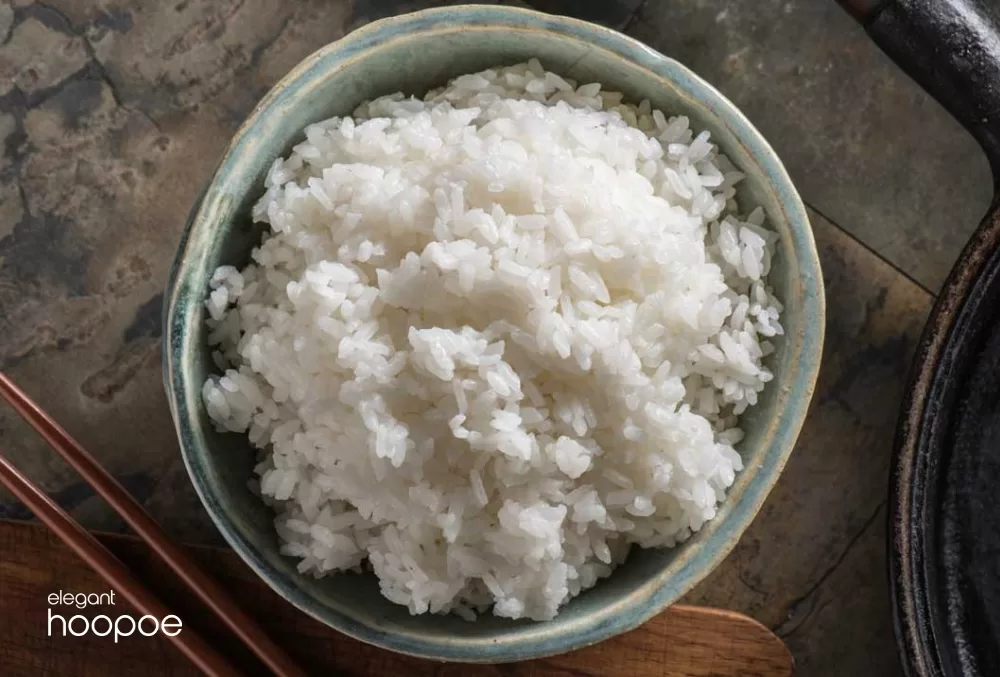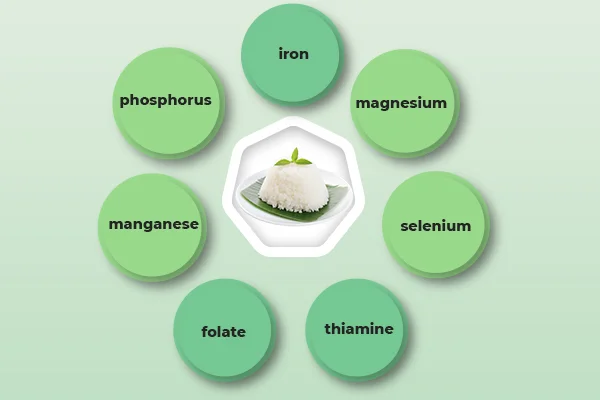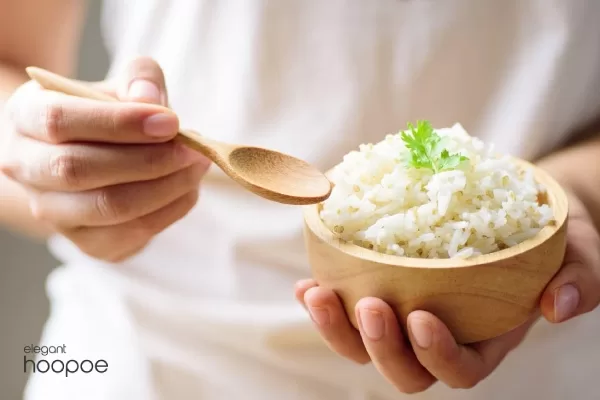Is Rice Good for Weight Loss? The Best Types, Benefits & Portion Tips
Yes, rice can be part of a weight loss diet when consumed mindfully. Here’s what you need to know:
- Type Matters: Brown and wild rice are higher in fiber and nutrients, making them better for weight management than white rice.
- Portion Control: Eating rice in moderation and balancing it with proteins and veggies helps prevent overeating.
- Glycemic Index: Whole grain rice has a lower glycemic index than refined rice, reducing blood sugar spikes.
- Preparation Methods: Steamed or boiled rice is healthier than fried versions.
- Alternatives: Quinoa and cauliflower rice are great low-carb substitutes.
By choosing the right type, portion size, and preparation method, rice can support weight loss without derailing your goals.
Rice, a dietary staple for a significant portion of the world’s population, has long been a subject of interest and debate when it comes to its effects on weight. Understanding the relationship between rice consumption and weight loss is crucial in today’s health-conscious society.
This article delves into rice for weight loss, exploring the nutritional content of rice, factors influencing its effects on weight, health benefits of different rice varieties, strategies for incorporating rice into a balanced diet for weight management, risks of overconsumption, and alternatives for individuals seeking to maintain a healthy weight.
By examining these aspects, we aim to provide a comprehensive overview of the role of rice in the context of weight and overall health.
Rice and Its Nutritional Content

Rice is a widely consumed staple food that provides sustenance for a large portion of the world’s population. It is a versatile grain that comes in various forms such as white, brown, and wild rice, each with its unique nutritional benefits.
Rice has been a dietary staple for centuries in many cultures due to its affordability, versatility, and ability to provide energy. It serves as a primary source of carbohydrates for a significant portion of the global population. In the following we talk more about this question: Is rice good for weight loss
Nutritional Composition of Rice

Rice is primarily composed of carbohydrates but also contains essential nutrients like vitamins, minerals, and fiber. The specific nutritional content can vary depending on the type of rice and how it is processed. Generally speaking, whole grain rice contains the following nutrients:
magnesium
phosphorus
manganese
selenium
iron
folate
thiamine
The table below shows the difference between each type of rice and their nutrition values.
| White rice | Brown rice | Red rice | ||
|---|---|---|---|---|
| Calories | 123 | 123 | 111 | |
| Carbohydrates (grams) | 26 | 25.6 | 23.5 | |
| Fiber (grams) | .9 | 1.6 | 1.8 | |
| Protein (grams) | 2.91 | 2.74 | 2.3 | |
| Fat (grams) | 0.37 | .97 | .8 | |
| Potassium (mg) | 56 | 86 | 78.5 | |
| Iron (mg) | 0.24 | .56 | .54 | |
| Calcium (mg) | 19 | 3 | 2.4 |
You might also like: Weight Loss Supplements
Is rice good for weight loss or Gain
Rice plays a significant role in weight management due to its caloric content and macronutrient profile. Understanding how rice consumption affects weight can help individuals make informed dietary choices.
Rice is calorie-dense, with carbohydrates being its primary macronutrient. However, it also contains some protein and minimal fat. The way rice is prepared and consumed can influence its impact on weight.
Link Between Eating Rice and Weight
Research on the weight loss rice has yielded mixed results. Factors such as portion sizes, preparation methods, and overall dietary habits play a crucial role in determining the impact of rice on weight.
Several factors can influence how rice consumption affects weight, including portion control, serving sizes, preparation methods, and cooking techniques. Being mindful of these factors can help individuals manage their weight effectively.
Portion Control and Serving Sizes
Controlling portion sizes and being mindful of the quantity of rice consumed can prevent excessive calorie intake and help maintain a healthy weight. Opting for smaller serving sizes or incorporating other nutrient-dense foods alongside rice can be beneficial.
The way rice is prepared can impact its nutritional content and overall caloric value. Choosing healthier cooking methods such as steaming or boiling instead of frying can help retain more nutrients and reduce added fats, thus supporting weight management.
Health Benefits of Different Types of Rice

Different types of rice, such as white, brown, and wild rice, offer varying nutritional profiles and health benefits. Understanding these differences can help individuals make informed choices based on their dietary needs.
White rice is processed and polished, resulting in a lower nutrient content compared to brown and wild rice, which retain their bran and germ layers. Brown and wild rice offer more fiber, vitamins, and minerals, making them a healthier choice.
Antioxidant and Fiber Content in Different Rice Varieties
Brown and wild rice varieties are rich in antioxidants and dietary fiber, which contribute to better digestion, improved metabolic health, and reduced risk of chronic diseases. Including a variety of rice types in the diet can offer a range of health benefits beyond weight management.
Brown rice is often recommended to people who want to lose weight or to better manage their calorie intake. According to AHA or American Heart Association:
Brown rice is a great source of fiber which could have so many health benefits and help the digestive system. It might also improves cholesterol levels which will lower the risk of heart related problems and even strokes. This type of rice will make you fell full for longer and that can help you receive less calories than you normally would.
You might also like: Best ways to get a flat stomach fast and sade!
Some type of Rice might increase blood sugar
Some foods can make your blood sugar that can be measured with glycemic index. Foods with high GI can cause quick spikes in your blood sugar levels. This is linked to weight gain and increased diabetes risk. On the other side of the coin, foods with low GI can cause a more gradual increase in blood sugar and that makes them healthier for people facing diabetes.
Now whole grains generally have lower GI than refined grains and this is why diets containing high amount of whole grains can reduce the risk of type two diabetes. The starch composition of rice might be the factor explaining this. Sticky rice have high amount of starch amylopectin and has a high GI.
Alternatively, non-sticky rive have high amount of amylose and low GI this means that it is digested slower and does not cause spikes in blood sugar.
How to Eat Rice The Right Way
Rice can be a delicious and versatile addition to your diet, but moderation is key when it comes to weight management.
To balance your rice intake, pair it with other food groups and nutrient-dense foods. Adding lean proteins, vegetables, and healthy fats to your rice dishes can help create a well-rounded and satisfying meal.
Balance with Other Food Groups and Nutrient-Dense Foods
When enjoying rice, consider incorporating colorful vegetables, lean proteins like chicken or tofu, and sources of healthy fats such as avocado or nuts. This not only adds variety and flavor to your meal but also helps to balance out the carbohydrates in rice with other essential nutrients.
For those conscious of their weight, portion control is key when it comes to rice. Opt for whole grain or brown rice for added fiber and nutrients. Meal prepping rice in controlled portions can also help you manage your intake and prevent overeating. Experiment with different rice varieties like jasmine, basmati, or wild rice to keep your meals interesting.
While rice can be a staple in many diets, overconsumption can lead to potential risks for weight management. Excessive intake of rice can impact sugar levels and overall metabolic health, potentially hindering your weight management goals.
Is basmati rice good for weight loss?
When it comes to weight loss, choosing the right type of rice can make a difference. Basmati rice, known for its distinct aroma and fluffy texture, is often considered a healthier option. It has a lower glycemic index compared to other rice varieties, which means it causes a slower rise in blood sugar levels, helping to control hunger and cravings.
Additionally, basmati rice is rich in fiber, promoting digestion and keeping you feeling full longer. Incorporating basmati rice into a balanced diet can aid your weight loss journey while allowing you to enjoy delicious meals. So, if you’re looking for a satisfying side dish that won’t derail your progress, basmati rice could be a great choice.
Is wild rice good for weight loss?
When considering options for weight loss, many people ask, “Is wild rice good for weight loss?” This nutritious grain is packed with fiber, which can help you feel full and satisfied after meals, reducing the likelihood of overeating. Wild rice also has a lower calorie count compared to white rice, making it a lighter choice for those looking to manage their weight.
Additionally, it’s rich in antioxidants and essential nutrients, contributing to overall health. Including wild rice in your diet not only adds a nutty flavor to your dishes but also supports your weight loss efforts by keeping you nourished and energized throughout the day.
Effects of Excessive Rice Intake on Sugar Levels
Rice is a high-carb food that can cause spikes in blood sugar levels, especially when consumed in large quantities. This rapid rise and fall in blood sugar can lead to increased hunger and cravings, making it challenging to maintain a healthy weight. Monitoring portion sizes and pairing rice with proteins and fiber-rich foods can help mitigate these effects.
Potential Impact of Rice on Metabolic Health and Weight Management
For individuals looking to manage their weight, it’s important to be mindful of the type and amount of rice consumed. White rice, in particular, has been linked to metabolic issues due to its high glycemic index. Consider incorporating whole grain alternatives or limiting your rice intake to support better metabolic health and weight management.
Rice Alternatives for Better Weight Management
For those seeking weight loss rice, there are several options available that can still contribute to a well-rounded diet. Exploring alternatives like quinoa, cauliflower rice, and other low-carb substitutes can offer variety and help support your weight management goals.
Exploring Quinoa, Cauliflower Rice, and Other Low-Carb Substitutes
Quinoa is a nutrient-dense seed that provides protein, fiber, and essential nutrients, making it a great alternative to rice. Cauliflower rice, made from grated cauliflower, is low in carbs and calories, making it a versatile and nutritious substitute. Experiment with these alternatives in recipes that traditionally feature rice to discover new flavors and textures while prioritizing your weight-conscious goals.
Rice for weight loss conclusion

In conclusion, rice can be a valuable addition to a well-rounded diet when consumed in moderation and with awareness of portion sizes and preparation methods. By considering the diverse nutritional profiles of different rice types and incorporating mindful eating practices, individuals can enjoy the health benefits that rice offers while supporting their weight management goals.
As with any food choice, balance and moderation are key in harnessing the positive attributes of rice while mitigating potential risks associated with overconsumption. Ultimately, making informed decisions about rice consumption can contribute to a wholesome approach to maintaining a healthy weight and overall well-being.







